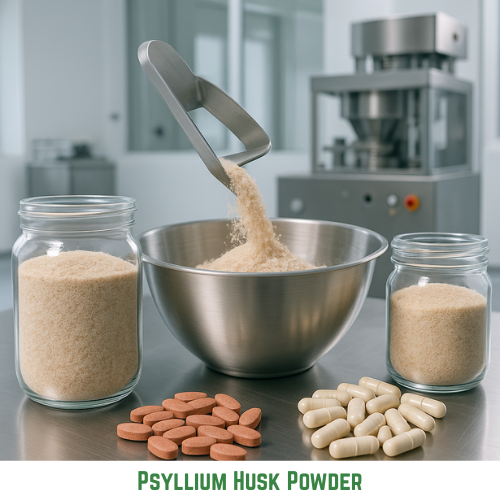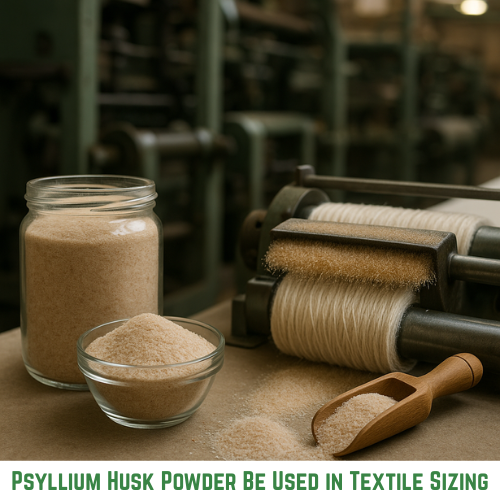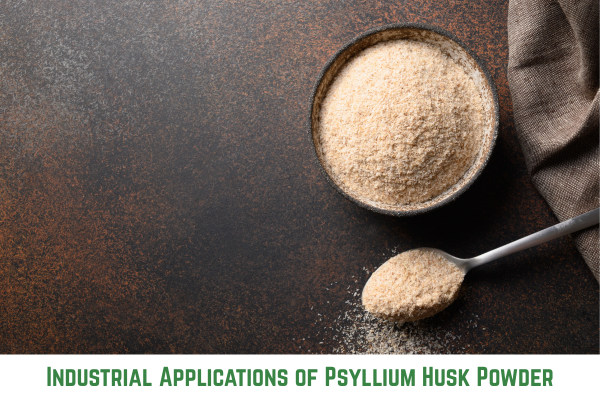Table of Contents
Psyllium husk powder, commonly known for its digestive health benefits in the food and pharmaceutical industries, has found numerous industrial applications due to its unique properties. The versatility of psyllium husk powder extends far beyond the kitchen and medicine cabinet, making it an invaluable component in a variety of industrial sectors. From its use as a binder in tablet and capsule manufacturing to its role in eco-friendly packaging and biodegradable plastics, psyllium husk powder is increasingly being recognized for its functionality and environmental benefits. This article explores the various industrial applications of psyllium husk powder, highlighting its role in the formulation of different products and its contribution to more sustainable practices across industries.
How is Psyllium Husk Powder Used as a Binder in Tablet and Capsule Manufacturing?
Psyllium husk powder is widely utilized in the pharmaceutical industry as a binder in tablet and capsule formulations. When added to tablet or capsule ingredients, it helps to hold the components together, ensuring the product maintains its integrity throughout the manufacturing process and during storage. The natural binding properties of psyllium husk come from its ability to absorb water and form a gel-like structure. This gel-like consistency helps to keep the powdered ingredients in a compact form, preventing them from separating. Additionally, the fiber in psyllium improves the controlled release of active ingredients, making it an ideal choice for controlled-release formulations in the pharmaceutical industry.

What Role Does Psyllium Husk Powder Play as a Gelling Agent in Adhesives?
In the adhesive industry, psyllium husk powder serves as an effective natural gelling agent. It helps to thicken and stabilize adhesive formulations, enhancing their viscosity and ensuring the desired texture. Psyllium’s high water retention ability makes it a perfect choice for water-based adhesives, where its ability to form a gel-like structure provides the adhesive with the right consistency for easy application. Furthermore, the inclusion of psyllium husk powder as a gelling agent can improve the adhesive’s longevity and strength, making it suitable for a variety of industrial applications, including packaging, construction, and automotive industries.
Can Psyllium Husk Powder Be Used as an Eco-Friendly Thickener in Water-Based Paints?
Yes, psyllium husk powder is increasingly used as an eco-friendly thickener in water-based paints. Traditional thickeners often contain synthetic chemicals that can harm the environment, but psyllium husk provides a natural, biodegradable alternative. When used in paints, psyllium husk powder helps to improve the viscosity, ensuring that the paint is easy to apply while maintaining a smooth texture. The natural fiber also helps prevent the paint from dripping, offering a controlled application and more uniform coverage. As the demand for environmentally friendly products grows, psyllium husk powder is gaining popularity as a sustainable thickening agent in the paint industry.
How is Psyllium Husk Powder Used in Biodegradable Packaging Materials?
Psyllium husk powder has found a promising application in the development of biodegradable packaging materials. With increasing environmental concerns regarding plastic waste, many industries are seeking eco-friendly alternatives. Psyllium husk powder is used as a component in biodegradable packaging because of its natural, plant-based origin and its ability to bind and hold materials together. When combined with other biodegradable materials, psyllium enhances the strength and flexibility of the packaging while also improving its biodegradability. This makes psyllium an essential ingredient in creating more sustainable packaging solutions in industries ranging from food and beverage to e-commerce.
What Role Does Psyllium Husk Powder Serve in Soil Stabilization in Horticulture?
In horticulture, psyllium husk powder is utilized as a soil stabilizer. Its natural water retention and gel-forming properties make it an effective agent in improving soil structure. When mixed with soil, psyllium husk can help bind soil particles together, reducing erosion and improving water retention in the soil. This results in better moisture retention for plants, which is especially beneficial in dry or arid climates. Furthermore, psyllium husk powder can be used in erosion-prone areas such as gardens, golf courses, and agricultural fields, providing a more sustainable way to enhance soil stability and promote healthy plant growth.
How is Psyllium Husk Powder Used in the Production of Bio-Based Plastics?
Psyllium husk powder is increasingly being used in the production of bio-based plastics, a sustainable alternative to traditional petroleum-based plastics. The natural fiber in psyllium helps to reinforce the plastic, improving its strength and durability while maintaining a more environmentally friendly profile. As the demand for eco-friendly plastics rises, psyllium husk powder plays a crucial role in replacing synthetic materials, offering a biodegradable, plant-based option. Bio-based plastics containing psyllium husk are used in packaging, agricultural films, and other products, providing an environmentally responsible solution to plastic waste issues.
Can Psyllium Husk Powder Be Used in Textile Sizing?
Psyllium husk powder is used in textile sizing to improve the texture and consistency of fabrics. Sizing agents are added to fabrics to enhance their strength and prevent fraying during the manufacturing process. Psyllium’s natural fiber content makes it an excellent addition to textile sizing formulations, as it helps to provide a smooth, even finish while adding strength and durability to the fabric. As the textile industry increasingly turns to more sustainable and biodegradable materials, psyllium husk powder offers an eco-friendly alternative to synthetic sizing agents, making it a valuable option in the production of natural and sustainable textiles.

How Does Psyllium Husk Powder Function as a Dispersing Agent in Pesticides?
In the pesticide industry, psyllium husk powder is used as a dispersing agent to improve the spreadability and uniformity of pesticide formulations. It helps to break down and distribute active ingredients evenly when mixed with water, ensuring that the pesticide is applied evenly across surfaces without clumping or settling. By improving the consistency of the formulation, psyllium husk powder ensures that the pesticide remains effective and provides better coverage. Furthermore, psyllium’s natural, biodegradable properties make it an attractive alternative to synthetic dispersing agents, offering an eco-friendly option for pesticide formulations.
Conclusion
Psyllium husk powder is proving to be an incredibly versatile ingredient across a wide range of industries, from pharmaceuticals and textiles to paints and biodegradable plastics. Its unique properties, such as water retention, gelling, and binding, make it an ideal solution for applications that require natural, eco-friendly alternatives to synthetic chemicals. As sustainability becomes a central focus across industries, psyllium husk powder’s role in creating more sustainable, biodegradable, and environmentally responsible products continues to grow. From improving the texture of adhesives and paints to supporting the creation of bio-based plastics and enhancing soil stability, psyllium husk powder is emerging as a critical ingredient for industries striving for innovation and sustainability.



